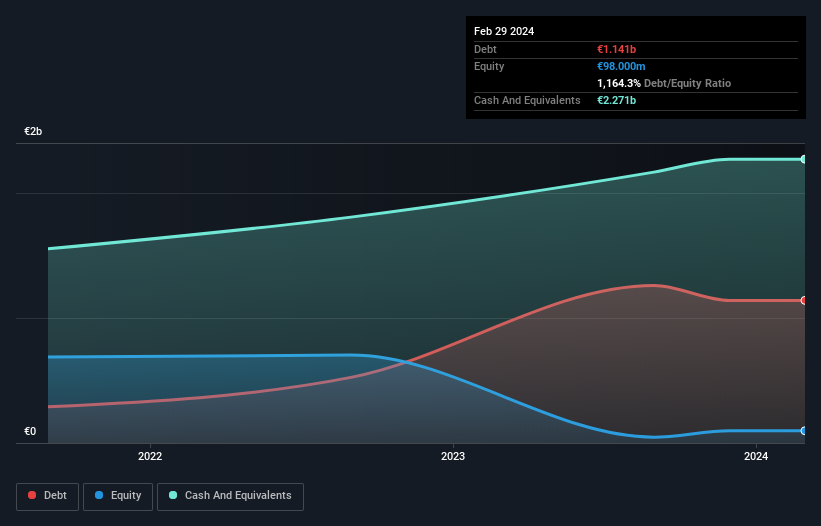Legendary fund manager Li Lu (who Charlie Munger backed) once said, 'The biggest investment risk is not the volatility of prices, but whether you will suffer a permanent loss of capital.' So it seems the smart money knows that debt - which is usually involved in bankruptcies - is a very important factor, when you assess how risky a company is. We note that Pluxee N.V. (EPA:PLX) does have debt on its balance sheet. But the real question is whether this debt is making the company risky.
What Risk Does Debt Bring?
Debt is a tool to help businesses grow, but if a business is incapable of paying off its lenders, then it exists at their mercy. Ultimately, if the company can't fulfill its legal obligations to repay debt, shareholders could walk away with nothing. However, a more frequent (but still costly) occurrence is where a company must issue shares at bargain-basement prices, permanently diluting shareholders, just to shore up its balance sheet. Of course, the upside of debt is that it often represents cheap capital, especially when it replaces dilution in a company with the ability to reinvest at high rates of return. The first step when considering a company's debt levels is to consider its cash and debt together.
Check out our latest analysis for Pluxee
What Is Pluxee's Net Debt?
You can click the graphic below for the historical numbers, but it shows that as of February 2024 Pluxee had €1.14b of debt, an increase on €525.0m, over one year. However, its balance sheet shows it holds €2.27b in cash, so it actually has €1.13b net cash.

How Healthy Is Pluxee's Balance Sheet?
According to the last reported balance sheet, Pluxee had liabilities of €5.75b due within 12 months, and liabilities of €289.0m due beyond 12 months. Offsetting this, it had €2.27b in cash and €1.50b in receivables that were due within 12 months. So its liabilities outweigh the sum of its cash and (near-term) receivables by €2.27b.
While this might seem like a lot, it is not so bad since Pluxee has a market capitalization of €4.22b, and so it could probably strengthen its balance sheet by raising capital if it needed to. But it's clear that we should definitely closely examine whether it can manage its debt without dilution. Despite its noteworthy liabilities, Pluxee boasts net cash, so it's fair to say it does not have a heavy debt load!
In addition to that, we're happy to report that Pluxee has boosted its EBIT by 36%, thus reducing the spectre of future debt repayments. When analysing debt levels, the balance sheet is the obvious place to start. But ultimately the future profitability of the business will decide if Pluxee can strengthen its balance sheet over time. So if you want to see what the professionals think, you might find this free report on analyst profit forecasts to be interesting.
Finally, while the tax-man may adore accounting profits, lenders only accept cold hard cash. While Pluxee has net cash on its balance sheet, it's still worth taking a look at its ability to convert earnings before interest and tax (EBIT) to free cash flow, to help us understand how quickly it is building (or eroding) that cash balance. Over the last three years, Pluxee actually produced more free cash flow than EBIT. That sort of strong cash conversion gets us as excited as the crowd when the beat drops at a Daft Punk concert.
Summing Up
Although Pluxee's balance sheet isn't particularly strong, due to the total liabilities, it is clearly positive to see that it has net cash of €1.13b. The cherry on top was that in converted 110% of that EBIT to free cash flow, bringing in €359m. So we don't think Pluxee's use of debt is risky. There's no doubt that we learn most about debt from the balance sheet. But ultimately, every company can contain risks that exist outside of the balance sheet. These risks can be hard to spot. Every company has them, and we've spotted 2 warning signs for Pluxee you should know about.
Of course, if you're the type of investor who prefers buying stocks without the burden of debt, then don't hesitate to discover our exclusive list of net cash growth stocks, today.
New: Manage All Your Stock Portfolios in One Place
We've created the ultimate portfolio companion for stock investors, and it's free.
• Connect an unlimited number of Portfolios and see your total in one currency
• Be alerted to new Warning Signs or Risks via email or mobile
• Track the Fair Value of your stocks
Have feedback on this article? Concerned about the content? Get in touch with us directly. Alternatively, email editorial-team (at) simplywallst.com.
This article by Simply Wall St is general in nature. We provide commentary based on historical data and analyst forecasts only using an unbiased methodology and our articles are not intended to be financial advice. It does not constitute a recommendation to buy or sell any stock, and does not take account of your objectives, or your financial situation. We aim to bring you long-term focused analysis driven by fundamental data. Note that our analysis may not factor in the latest price-sensitive company announcements or qualitative material. Simply Wall St has no position in any stocks mentioned.
About ENXTPA:PLX
Pluxee
Offers employee benefits and engagement solutions services in France, Latin America, Continental Europe, and internationally.
Undervalued with solid track record.
Similar Companies
Market Insights
Community Narratives




